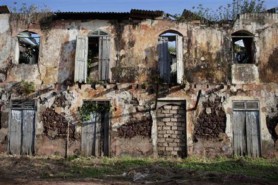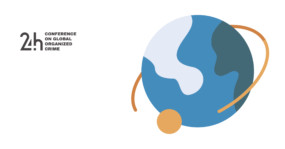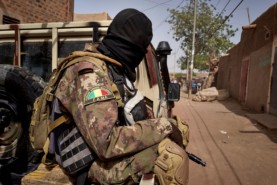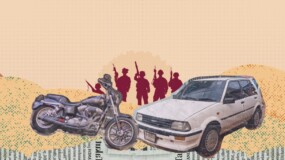Posted on 04 Feb 2022
A recent incident in Guinea-Bissau at first sight bears the hallmarks of a failed military coup, but closer scrutiny leaves many unanswered questions. Either way, it is almost certain to have been linked to the country’s cocaine trade.
On 1 February, gunshots at the governmental palace in Bissau signalled the beginning of a reported failed coup attempt in Guinea-Bissau, a country long known for its prominent role in international cocaine trafficking. Had the incident resulted in a military overthrow of power, it would have been the 5th coup in West Africa in the last 12 months, hot on the heels of the seizure of power in Burkina Faso in late January.
Five hours after the gunfire began, President Umaro Sissoco Embaló addressed the press, condemning the incident and declaring the perpetrators had failed. In press statements, he said that 11 people had died in the alleged coup attempt. Although vague on the identity of those behind the incident, the president indicated its possible links to the cocaine trade: ‘Some individuals involved in this cowardly and barbaric act were already being investigated for drug trafficking.’
Beside him at the press briefing was Prime Minister Nuno Gomes Nabiam, in a show of unity that belies long-standing tensions between the two men. Markedly absent was chief of staff of the military, Biaguê Na N’Tam, a staunch advocate of military non-interference in politics. Given N’Tam’s role as head of the military, the fact he was nowhere to be seen following the reported coup attempt is baffling. There have been recent rumours of N’Tam’s death, although these have been refuted by government representatives.
Guinea-Bissau first emerged as a key transit point in cocaine trafficking routes between Latin America and consumer markets in Europe in the early 2000s. A subsequent decline in reported cocaine seizures in the country since 2008, and a near absence in the period between 2013 and 2018, drove speculation that the country had abandoned its role as an international drugs trans-shipment hub. However, two cocaine seizures in 2019 – of 789 kilograms in March and 1 869 kilogrammes in September – soon put paid to this theory. These seizures, as well as others in neighbouring countries, have once again shone the spotlight on West Africa as a major cocaine ‘corridor’.
The deep-rooted involvement of Guinea-Bissau’s political-military elite in this illicit market has been a critical factor driving Guinea-Bissau’s repeated cycles of political turmoil. That Embaló implied that the coup attempt was linked to drug traffickers appeared to echo history. A 2012 coup, which brought a military junta led by General Antonio Indjai to power, was so clearly driven by competition for control over the country’s lucrative cocaine markets that it has been dubbed the ‘cocaine coup’.
Indjai has been on the sanctions lists of the UN Security Council, EU and US for his involvement in cocaine trafficking and his role in destabilizing Guinea-Bissau since the 2012 coup. Indjai, along with other sanctioned individuals, namely Mamadu N’Krumah and Ibraim Papa Camara, returned to public political life when Embaló took power in February 2020, bringing to a close contested elections that had plunged the country into a period of chronic political instability, and marked a dramatic return of the military to politics as members of the army occupied state buildings in support of Embaló. Since Embalo’s coming to power, executive influence over investigations by the Judicial Police (the most effective law enforcement body in Guinea-Bissau) has reportedly grown, and reports of involvement of high level figures in the political and military elite in illicit markets continue to mar the administration’s image.
In August 2021, the United States offered a US$5 million reward for information leading to the arrest of General Indjai, who is believed to remain involved in cocaine trafficking. The press statement accompanying the Department of State’s reward notice labelled Indjai ‘as one of the most powerful destabilizing figures in Guinea-Bissau, operating freely throughout West Africa, using illegal proceeds to corrupt and destabilize other foreign governments and undermine the rule of law throughout the region’.
Communications from government representatives appear to link Indjai to the recent events. On the eve of the reported coup attempt, Fernando Vaz, spokesperson of the Guinean government and Minister of Tourism, appears to have sent a WhatsApp message to a number of well-connected Bissau-Guineans reporting that the attempt had been unsuccessful, and that Admiral Bubo Na Tchuto, arrested in a US Drug Enforcement Administration sting operation for involvement in cocaine trafficking in 2013, had been imprisoned. Intriguingly, in a follow-up message, Vaz simply listed four names; one of them was Indjai.
The Global Initiative Against Transnational organized Crime has been unable to verify reports of Tchuto’s imprisonment: sources indicate that he is in a military barracks outside Bissau, together with other senior military figures; other sources report he remains at his home. Vaz gave no explanation for the four names but the implication appears to be that he believed them to have been involved in the reported attempt. If the incident was indeed a coup attempt, many stakeholders in Bissau will be unsurprised if Indjai, who holds no official military position – although he does retain significant power – was implicated.
However a number have commented in Bissau that Tuesday’s incident was a ‘very strange coup attempt’. Guinea-Bissau has had more than its fair share of coups, four of which were successful, together with a myriad of political assassinations. The country’s previous coups have been executed swiftly and decisively, in the space of 30 minutes to an hour. In the recent incident, however, the fighting – which experts suggest involved the military, and would have required high level connections given the high calibre of weapons – dragged on for five hours. Yet only one assailant is reported to have been killed in the fighting. Details regarding the alleged perpetrators also remain unclear, causing some commentators to question the nature of the attack on the presidential palace.
While questions remain whether Tuesday’s incident was a genuine attempt to overthrow President Embaló, the current administration has certainly benefited from the incident and strengthened its hold on power by presenting themselves as embattled defendants of the rule of law, persecuted by ‘actors linked to drug trafficking’. This may conveniently serve to position the current administration as a key figurehead in the fight against cocaine trafficking in Guinea-Bissau and may help to court the support of the international community, which President Embaló has sought since coming to power.
The image of the country was foremost in President Embaló’s statement to the press, which was at pains to explain that the purpose of the attack was ‘to block the … construction of the new image of the country’, reportedly embraced by the current leadership, and to ‘facilitate the course of transnational organized crime’. The statement noted that the perpetrators remain unknown, but clearly had significant financial resources and a high degree of organization.
On 3 February, during an extraordinary conference of ECOWAS Heads of State and Government, which took place in Accra, the regional body decided to send a stabilization force to Guinea-Bissau. At the request of President Embaló, ECOWAS agreed to withdraw its previous stabilization force to Guinea Bissau, ECOMIB, in September 2020, following eight years of deployment in the country. The stabilization troops deployed to Guinea-Bissau, like those currently deployed in Gambia, will likely be Senegalese, under the coordination of Senegalese President Macky Sall, with whom Embaló has a close relationship.
At this stage, it remains unclear whether Tuesday’s attack on the presidential palace was a genuine coup attempt. What does appear clear is that the attack was somehow linked to cocaine trafficking – either an event perpetrated by those involved in cocaine trafficking, or helpful in the current administration’s positioning to observers at home and abroad. The cocaine trade has once again played a pivotal role in shaping Guinea-Bissau’s cycles of political instability.



